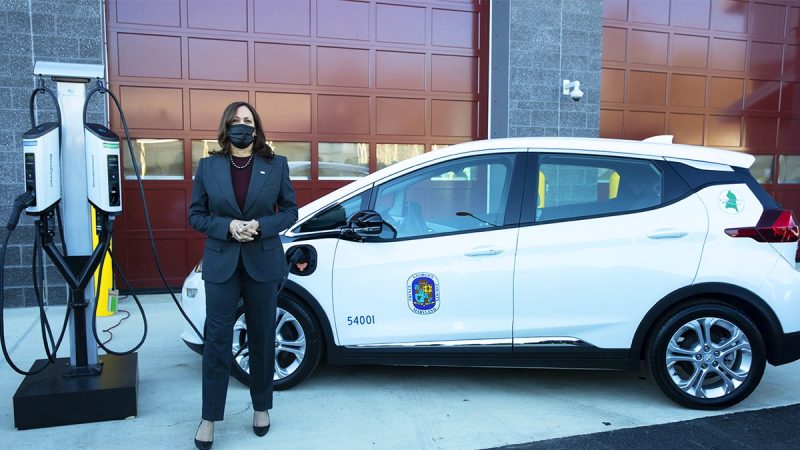
Harris touts growing up in middle class while pushing mandate most ‘won’t be able to afford’: economist
Vice President Harris frequently says that if elected she will build a ‘strong middle class,’ even as the Biden administration pushes for an electric vehicle mandate that one economist says is out of step with most middle-class Americans.
‘I believe we need to grow our middle class and make sure our economy works for everyone, for people like the people in the neighborhood where I grew up and the hardworking Americans I meet every day across our nation,’ Harris said at a campaign event in September. ‘When we invest in those things that strengthen the middle class – manufacturing, housing, health care, education, small businesses, and our communities – we grow our economy and catalyze the entire country to succeed.’
After becoming the Democrat presidential nominee, Harris said she does not support imposing mandates on electric vehicles. However, the Biden-Harris administration is currently pushing one that an economist says is not practical for the middle class.
‘We know just from the facts that middle-class people are rejecting EVs. There are a lot of reasons why that’s happening, why the trend is shifting on EVs, but one of them is the cost. These are $80,000 cars,’ Stephen Moore, economist and senior visiting fellow in economics at the Heritage Foundation, told Fox News Digital.
The Environmental Protection Agency (EPA) announced a final rule in March under the Clean Air Act to set new emissions standards that would require up to two-thirds of new car sales to be electric by 2032. The new standards would affect ‘light-duty vehicle manufacturers, independent commercial importers, alternative fuel converters, and manufacturers and converters of medium-duty vehicles,’ according to the EPA’s final rule.
The rule offers a tax credit of up to $7,500 for qualified purchases, but Moore said that even with the tax credit, EVs are ‘still out of [middle-class Americans’] price range.’
‘The idea that you’re going to force people to buy $75-, $80- $90,000 cars is going to mean a lot of Americans won’t be able to afford to buy a car if you continue with these mandates,’ he said.
Moore added that the Biden-Harris administration mandate, which the House voted to block in September, would prevent those in the middle class from being able to afford a car.
‘EVs are cars that wealthy people can afford, but not middle-class people, for the most part. They’ve got these mandates that say eventually 65% of cars are going to be EVs, but you’ve only got half that number of people that want to buy EVS. That means that there’s going to be a shortage of gas cars, which is the cars that middle-class people can afford,’ Moore said in an interview with Fox News Digital.
The average electric vehicle costs more than $56,000 as of September 2024, according to Kelley Blue Book, a vehicle valuation firm.
The average middle-class American earns two-thirds or double the median national household income, which stands at $80,610, according to the U.S. Census Bureau via Federal Reserve Economic Data (FRED). Given the current median, the middle-class income today ranges from about $53,000 to $160,000.
A Capital One price analysis on electric vehicles reported that EV purchases are ‘out of reach of anyone bringing home less than about $120,000 per year,’ thus excluding most of the middle class from eligibility based on the U.S. Census Bureau via FRED average.
Recent surveys suggest that most middle-class Americans are not currently looking to purchase an electric vehicle.
A Gallup survey released in April found that only 5% of middle-income Americans own an electric vehicle and that 44% would not consider buying one. Additional polling from Pew Research, released in June, found that three in 10 Americans would seriously consider buying an electric vehicle.
‘Why are EVs practical for anyone (not just the middle class)? They offer a superior driving experience. They are quieter, smoother and have far superior acceleration,’ John Higham, Electric Vehicle Association Board of Directors, argued that electric vehicles can be more practical for middle class citizens.
Higham noted the factor of charging as a main reason every household might not be ready for an electric vehicle.
‘I think most importantly is EVs can be more economical to drive. Note I said ‘can be.’ They can also be more expensive to drive and I see a lot of math tilted to show that later instead of demonstrating the former,’ Higham told Fox News Digital. ‘Then if EVs are nicer to drive and can cost less than a gasoline counterpart, why aren’t they for everyone one? It comes down to charging. If you can charge at home, you are likely a good candidate for an EV. If not, then probably not.’
Fox News Digital reached out to the Harris campaign for comment.
